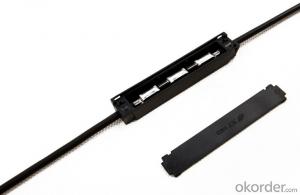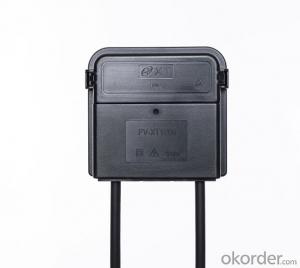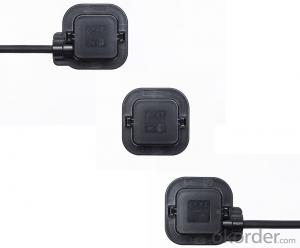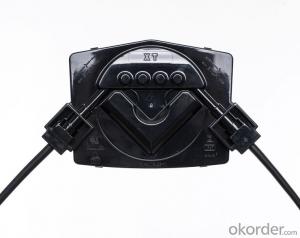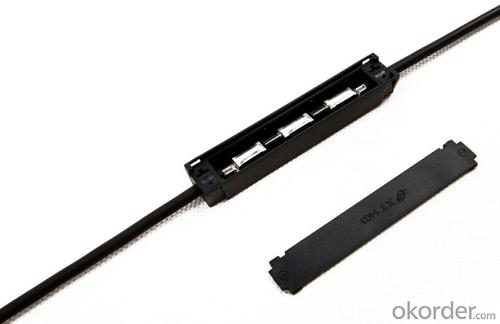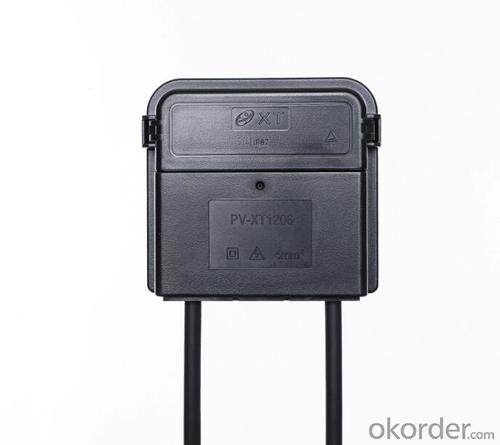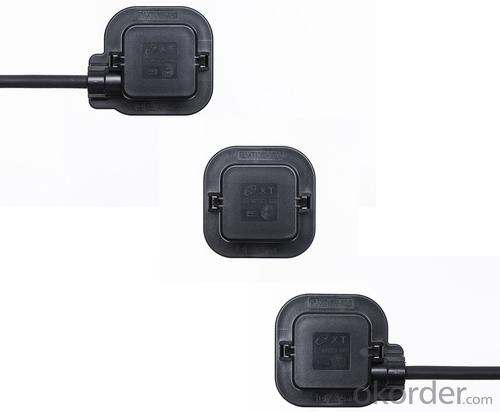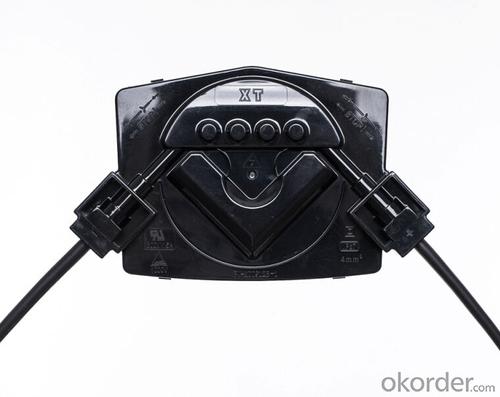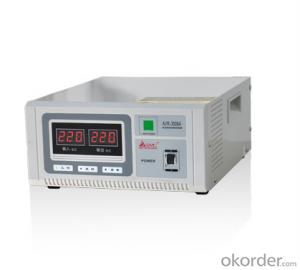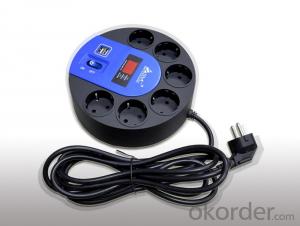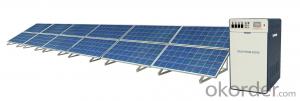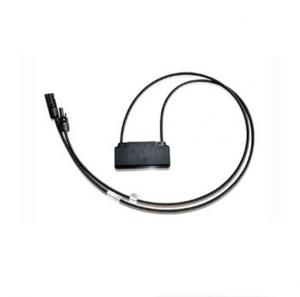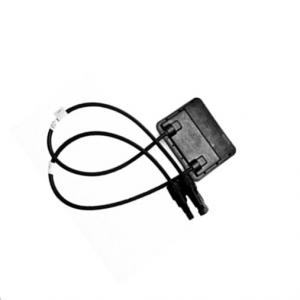Solar Energy Systems Yonkers NY PV Junction Box XT04 Long Usable with TUV, UL, ISO9001 Certification
- Loading Port:
- Guangzhou
- Payment Terms:
- TT OR LC
- Min Order Qty:
- 3000 pc
- Supply Capability:
- 3000000 pc/month
OKorder Service Pledge
OKorder Financial Service
You Might Also Like
Feature
a. leading Technology
b.long usable
c. securable and reliable Structure
d. simple Operation and easy Installation
e. low contact Resistance
f.good electric Protection
Product description
1. All the connection made by double fixed connection low power loss
2. With the capacity of anti-aging and resistance to ultraviolet radiation on the outer cover with excellent box design with good thermal dissipation
3. Demonstrating safe, realiable and excellent lasting functionality, applicable in harsh outdoors working ambient
4. Big variety for choices,1 rail ,2 rail,3 rail,4 rail,5 rail,6 rail.mini junction box and solar junction box for solar street light
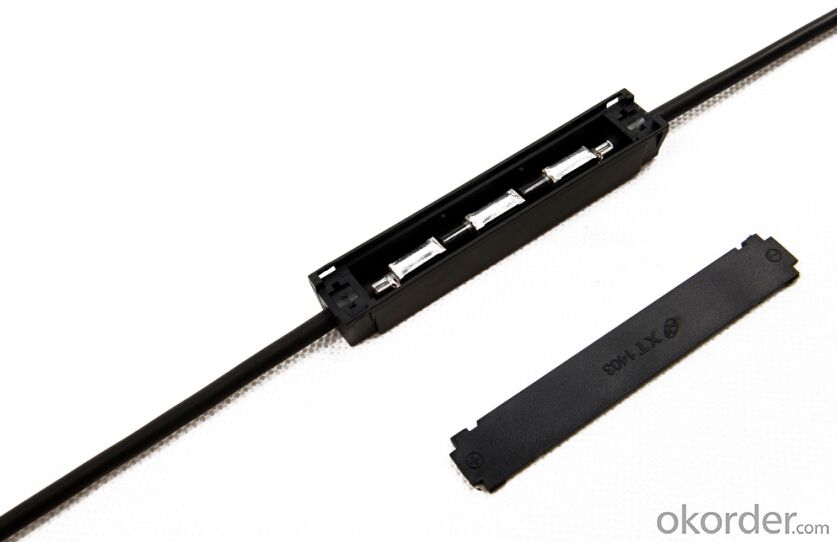
Item | Data |
Terminals for Ribbons | 3/4 |
Rated Current | 7A |
Rated Voltage | 1000V |
Dimension | 119*81.3*21.6mm |
Temperature | -40℃~+85℃ |
Size of Cables | 4 mm2/12AWG |
Size of Ribbons | W(6±2mm)*T(0.3±0.15mm) |
Protection Degree | IP65 |
Flammability Class | V-0 |
FAQ
1. Where can I buy your products?
You could find our products from dealers or contact our sales team directly. We will provide you with detailed services.
2. How to contact us?
Contact details can be found from website www.okorder.com to contact us. We look forward to providing you with professional services.
- Q: What is the role of trackers in a solar energy system?
- The optimization of solar panel efficiency and output is made possible by the crucial role played by trackers in a solar energy system. These devices are specifically designed to track the sun's movement throughout the day and alter the position of the solar panels accordingly. By continuously orienting the panels towards the sun, trackers guarantee that they receive the highest amount of sunlight possible, which ultimately leads to an increase in energy production. The primary objective of trackers is to maximize the amount of solar energy captured by solar panels, achieved by maintaining an optimal angle in relation to the sun. This is made possible through the utilization of sensors, motors, and control systems that enable the tracker to follow the sun's path from east to west. By consistently adjusting the position of the panels, trackers ensure that the sunlight hits them at a perpendicular angle, thus optimizing the absorption of solar radiation. Trackers prove to be particularly advantageous in locations where there are significant fluctuations in sunlight intensity throughout the day or across different seasons. By actively tracking the sun's movements, trackers can compensate for these variations and maintain a consistent level of solar energy production. This becomes especially crucial in regions characterized by distinct seasonal changes, as it allows solar panels to capture sunlight at the most effective angle year-round, thereby maximizing energy output. Moreover, trackers can greatly improve the overall economics of a solar energy system. By enhancing the efficiency of solar panels, trackers enable more electricity to be generated from the same surface area. This results in the requirement of fewer panels to produce a given amount of energy, thereby reducing the overall cost of the system. Additionally, trackers can increase the return on investment by maximizing energy output and reducing the time it takes to recoup the initial investment made in the solar installation. In conclusion, the role of trackers in a solar energy system is to continuously adjust the position of solar panels in order to optimize their performance and efficiency. By maximizing the amount of sunlight captured, trackers enhance energy production, improve the economics of the system, and ensure a consistent level of solar energy generation throughout the day and across different seasons.
- Q: Is solar energy reliable?
- Yes, solar energy is reliable. It is a renewable energy source that harnesses the power of the sun, which is a constant and abundant source of energy. With advancements in technology, solar panels have become more efficient and dependable, making solar energy a reliable and sustainable option for generating electricity.
- Q: How do solar energy systems affect the aesthetics of a building?
- Solar energy systems can have both positive and negative effects on the aesthetics of a building. On one hand, solar panels can be visually appealing and add a modern, eco-friendly touch to the structure. They can be seamlessly integrated into the design, enhancing the overall look of the building. On the other hand, if not properly installed or maintained, solar panels can appear bulky and disrupt the visual harmony of the building. The placement and orientation of the panels should be carefully considered to minimize any negative impact on the building's aesthetics.
- Q: How do solar energy systems handle excess energy production?
- Solar energy systems handle excess energy production through a process called net metering. When the solar panels produce more electricity than needed, the excess energy is fed back into the grid, and the solar system owner receives credits for the surplus electricity. These credits can then be used to offset the electricity consumed from the grid during periods of low solar energy production, such as at night or during cloudy days.
- Q: Can solar energy systems be used for powering electric battery manufacturing plants?
- Yes, solar energy systems can be used to power electric battery manufacturing plants. Solar panels can generate electricity from sunlight, which can be used directly to power the manufacturing operations or stored in batteries for later use. By utilizing solar energy, these plants can reduce their reliance on fossil fuels, lower their carbon footprint, and contribute to a more sustainable and renewable energy future.
- Q: Can a solar energy system be installed on a museum or cultural institution?
- Yes, a solar energy system can be installed on a museum or cultural institution. Solar panels can be mounted on the roof or in an open space surrounding the building to harness sunlight and convert it into electricity. This can help the institution reduce its reliance on conventional energy sources, lower its carbon footprint, and potentially save on electricity costs in the long run. Additionally, the installation of solar panels can also serve as an educational display, highlighting the institution's commitment to sustainability and renewable energy.
- Q: Can solar energy systems be used in areas with limited access to solar charge controllers?
- Yes, solar energy systems can still be used in areas with limited access to solar charge controllers. While solar charge controllers are important for regulating the flow of electricity from the solar panels to the batteries, there are alternative methods available. For example, manual charge controllers or simple voltage regulators can be used to protect the batteries from overcharging. Additionally, it is possible to design solar energy systems with smaller battery banks or use direct power consumption without the need for batteries, which eliminates the requirement for charge controllers altogether. Therefore, even in areas with limited access to solar charge controllers, solar energy systems can still be effectively utilized.
- Q: How much does a solar energy system cost?
- The cost of a solar energy system can vary depending on various factors such as the size of the system, location, government incentives, and installation costs. On average, a residential solar energy system can range from $10,000 to $30,000, but it is recommended to get a personalized quote from a solar installer for an accurate cost estimation.
- Q: Can solar energy systems be used in powering water pumps?
- Yes, solar energy systems can be used to power water pumps. Solar panels can generate electricity from sunlight, which can be used to run water pumps and provide a sustainable and renewable source of energy for pumping water. Additionally, solar-powered water pumps are often more cost-effective and environmentally friendly compared to traditional fuel-powered pumps.
- Q: Can solar energy systems be easily expanded or upgraded?
- Solar energy systems can be expanded or upgraded with ease. One of the key benefits of solar technology lies in its modular design, which allows for scalability and flexibility. If you have extra space, you can effortlessly increase the capacity of your system by adding more solar panels. Moreover, advancements in solar technology have simplified the integration of new panels into existing systems. To upgrade a solar energy system, one can replace older or less efficient components with newer and more efficient ones. For instance, higher capacity inverters or battery storage can be added for energy storage purposes. The ability to expand and upgrade solar energy systems makes them a cost-effective and sustainable solution for meeting growing energy demands over time.
Send your message to us
Solar Energy Systems Yonkers NY PV Junction Box XT04 Long Usable with TUV, UL, ISO9001 Certification
- Loading Port:
- Guangzhou
- Payment Terms:
- TT OR LC
- Min Order Qty:
- 3000 pc
- Supply Capability:
- 3000000 pc/month
OKorder Service Pledge
OKorder Financial Service
Similar products
Hot products
Hot Searches
Related keywords
